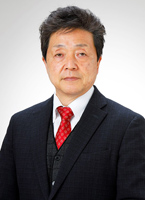Let’s eliminate language difficulties with AI Hajime Ota (Professor of Doshisha University)

Language ability, especially English ability, is a major handicap for Japanese people to succeed in global competition, whether in business or research.
Researchers need to be able to read a large amount of English literature, present conference reports in English, and reach a level where they can have discussions. Businesspeople also need a certain level of English proficiency in order to be able to negotiate and do business with local people. Moreover, the movement to make English the official language is becoming more and more widespread.
Therefore, Japanese people must devote more time and energy to learning English than ever before, starting in middle school and high school.
During this time, Westerners who are native English speakers can focus on creative activities and learning in their areas of expertise. As long as this handicap exists, the gap between Japan and Europe /America will never close. Furthermore, with the exception of certain fields such as sports, no matter how good someone’s ability is, simply not being able to speak English will prevent them from participating in global competition.
However, when considering Japan’s global strategy, the measure of putting even more effort into English education is too roundabout, and there is little hope that the situation will turn around.
So why not take the plunge and create a national strategy to free people from learning English?
This may seem too reckless, but advances in AI are making it more realistic.
Papers and articles written in English can already be translated into Japanese and read, and sentences written in Japanese can be translated into English and, with a few modifications, can be translated into English without any problems.
There is also a plan to utilize AI to overcome the burden of using a foreign language.
The university that Dwango and the Nippon Foundation are applying for approval to establish will not offer foreign language classes, but will instead teach students how to use machine translation using AI, and will read papers published in the global scientific journal Nature through machine translation. They are planning to hold classes to advance the course (conversation between Masao Kawakami and Soichiro Tahara, “Why is Dwango aiming to become an online university?” Ushio, January 2024 issue).
The problem is that conversations tend to have time lags. However, in recent years, it has become common to see foreign tourists with smartphones or translators in hand, conversing with Japanese people in their native language. South Korea’s Samsung Electronics is said to be releasing a smartphone with a simultaneous interpretation function soon. Considering the further evolution and spread of AI, even people who cannot speak English will be able to travel overseas without any inconvenience, and there will be no barriers to working or studying abroad.
The benefits don’t stop there. It is only a matter of time before the range of languages covered by automatic translation and simultaneous interpretation expands beyond English, and eventually people around the world will be able to communicate directly between their native languages without using English. If that happens, the structure of global hegemony in various fields such as economy, culture, and research that English-speaking countries have built through the medium of English may collapse.
Breaking down barriers and hierarchies through language, a means of communication, is of great significance.
